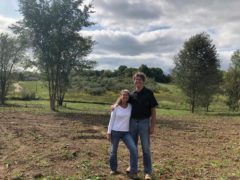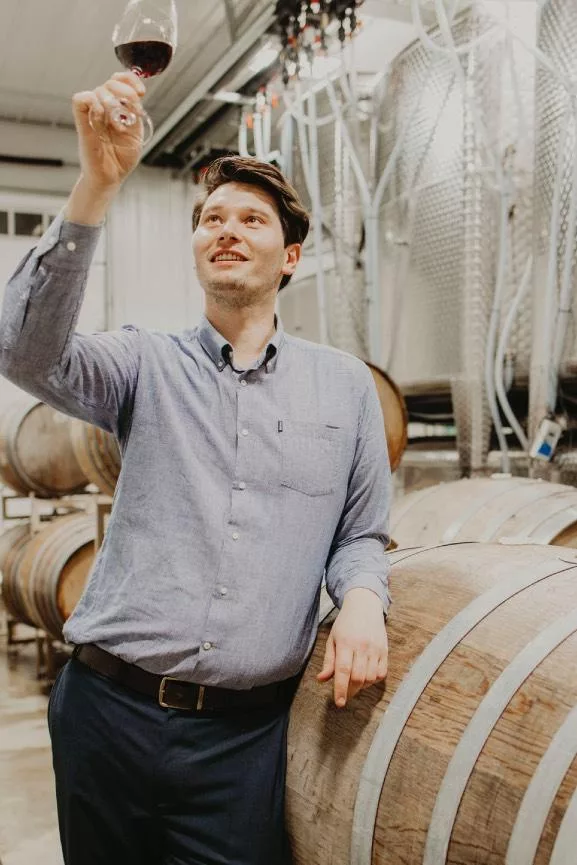The Wine and Viticulture Program at Lake Michigan College is looking back over a decade of careful, deliberate development and liking what it sees beginning to take shape in Southwest Michigan’s expanding wine industry: signs that the LMC program is making a difference for the future. A recent article by free lance journalist Erin Marie Miller in Michigan Uncorked Magazine examined a couple of examples. The story is re-published here on MoodyOnTheMarket.com with permission of the author and publication.
When Susan Chilton and her husband stumbled across a breathtaking 20-acre parcel of land for sale in Berrien County in early 2020, she felt an immediate connection to the property. “We went to look at it and I said, ‘Even if we never do anything with it, we have to be stewards of this land,’” Chilton recalls.
Despite that declaration, Chilton, then a student in the Wine and Viticulture Technology program at nearby Lake Michigan College, was impressed by the land’s soil and topography. She knew the terroir would be ideal for growing wine grapes and, as a recent empty nester, envisioned cleaning up the property and fulfilling her long-held dream of owning a vineyard.
That April, amid a global pandemic and shutdowns that brought the state’s business activity to an abrupt halt a month earlier, Chilton signed the closing documents for the land on the roof of a pickup truck to maintain social distancing during uncertain times. In the months that followed, Chilton found herself making plans for the next chapter of life – this time, as a new entrepreneur and grape producer in Southwest Michigan’s bourgeoning wine scene.
A proper education … and a little resilience
Committed to transforming the long-neglected property into a productive vineyard, Chilton spent the next year dividing her time between the couple’s home near Chicago in La Grange, Illinois, and a second home near the vineyard in Southwest Michigan, continuing to work while commuting three days a week to LMC while finishing her viticulture degree.
“If you’re going to chase a dream, whatever that dream is – whether you’re opening a restaurant or opening a new shop or pursuing starting a vineyard – you’ve got to have some fortitude. Nothing comes easily, no matter how well prepared you are,” Chilton says, noting that the lessons she learned from a career in the corporate world, along with a formal education in viticulture, provided the necessary mindset and skills for navigating the challenges of starting a business amid supply chain delays and inflation – a process that was “more labor intensive” than anticipated.
 Susan & Larry Chilton
Susan & Larry Chilton
Dubbed Shiny Quarter Vineyard (the name doubles as a hopeful nod to a shiny new quarter of life as a vineyard owner while honoring memories of rewarding Chilton’s three children with quarters for memorizing the names of songs while growing up), the property’s first five acres of vines were planted over the course of a week in May 2021.
“We had a bunch of our college friends and some neighbors come and help us,” Chilton recalls, noting that the first harvest is expected in 2023, with all the grapes already informally spoken for.
Since graduating from the viticulture program last spring, Chilton has used her position as a startup grape producer to establish new opportunities for alumni of LMC’s viticulture program in the region. Recently she hired David Pliml, a fellow LMC graduate, as vineyard manager. Chilton has also invited professors and students from the college to visit the land and
Susan and Larry Chilton use it as a sort of “laboratory” for enhancing their wine education.
“We’ve had the students from the viticulture program come out to see [Shiny Quarter], because it’s really a unique opportunity see a vineyard grow from dirt to vineyard,” Chilton says.
Growing the industry in Southwest Michigan
In Michigan, business ventures like Shiny Quarter Vineyard are part of a blossoming wine industry that has had an increasingly positive impact on the state in recent years. According to a nationwide report commissioned by WineAmerica, an industry group based in Washington, D.C., Michigan’s wine industry is expected to generate an economic impact of over $6 billion in 2022 – up from $5.4 billion cited in a 2017 study from the Michigan Craft Beverage Council – highlighting the industry’s potential.
For Michael Moyer, who heads the Wine and Viticulture program at LMC, watching students like Chilton pursue new business ventures after graduation while contributing to Southwest Michigan’s wine industry has been fulfilling.
“Wine truly is made in the vineyard. It is both exciting and rewarding to see a Wine and Viticulture graduate start with a quality vineyard site. I cannot wait to taste some wine from Shiny Quarter,” Moyer says.
Launched in the fall of 2015 under Moyer’s direction, the wine and viticulture program at LMC has seen around 45 students graduate and nearly 95 students enrolled full-time since its inception, including this year’s cohort. Offering courses ranging from chemistry to vineyard maintenance, winemaking, winery operations and more, in addition to hands-on learning opportunities at Lake Michigan Vintners, the first and only teaching winery and tasting room in the Midwest, students are offered a uniquely well-rounded education. Graduates have gone on to work in the wine industry in Michigan and other winemaking regions across the country.
From ships to cellars … and labs
Although planting new vineyards and launching wine businesses are popular options for LMC graduates, entrepreneurship isn’t the only career path available to wine and viticulture students. In Southwest Michigan, local wineries also provide opportunities for graduates to utilize their skills and education. For Caleb Vochaska, who recently accepted a role as assistant winemaker at Modales Wines in Fennville after graduating earlier this year, earning a degree in viticulture offered a chance to expand on earlier knowledge and skills gained while working intermittently in the wine world for over half a decade.
“Caleb is a very strong student. As assistant winemaker, he has an excellent opportunity to further develop his winemaking skills and help Modales continue to produce the world class wines they are becoming famous for,” Moyer says.
Despite having wine industry experience and a talent for winemaking, Vochaska, who also holds a Bachelor of Science in maritime technology and previously worked in commercial shipping and freights, made the decision to enroll in the viticulture program almost on a whim.
“It was kind of a COVID thing where I was like, ‘Well, there’s nothing better to do, so I might as well just go to school and get a degree in wine,” Vochaska recalls, adding that working for Modales became a goal after attending a wine tasting event there as a viticulture student.
In addition to having the chance to work closely with the head winemakers at Modales, Vochaska has also gotten hands-on experience making wine from Michigan-grown organic grapes during his time as assistant winemaker.
“It was our first year of farming organically, and so it’s really great to see the quality of the fruit that comes in without the conventional sprays – because for so many years, they’ve said you can’t farm grapes organically in Michigan because there’s too much disease,” Vochaska says.
For Vochaska, adjusting to the responsibilities of being assistant winemaker at a popular winery has been rewarding. Although the long hours of Vochaska’s first harvest season at Modales have been demanding, he says his formal education in wine left him up to the task.
“Now I have the lab skills where I’m bouncing back and forth between the cellar and the lab. Just being able to be in the lab and understand the science aspect of wine [is useful], because such a big portion of modern winemaking is quality control,” Vochaska says. When asked about his plans now that he’s armed with a viticulture degree, Vochaska says he intends to stay exactly where he is and shows no concern about the challenges that might pop up along the way.
Note: MoodyOnTheMarket.com thanks writer Erin Marie Miller and Editor In Chief Jim Rink of ‘Michigan Uncorked’ Magazine for this article and the photos.
Headline Photo: LMC Vitaculture Graduate Caleb Vochaska






